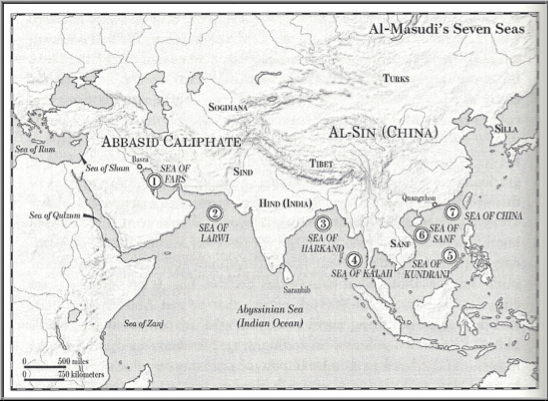
The Story of Aloeswood of Ubayd-Allah | A Short Anecdote from History

One of the envoys of the Abbasid caliph embarks upon a journey to India to bring for him the Indian aloeswood (agarwood, oud). But the turn of events brings a twist in the story...
Indeed one of the aspect of oud is that it transcended all human races and cultures, cut across all geographical boundaries to weave its magic and charm upon all throughout the recorded history! Even though the trees of agarwood grow in the far east, yet we find it being mentioned by ancient Egyptians and the Greeks, Romans, Persians and the Arabs for its fragrance, medicinal use, health benefits and therapeutic properties. Indeed it was one of the most sought after commodity by various societies and empires in trade with India, China and other eastern kingdoms and nations. It was part of major trade routes through land and sea like silk route, spice routes and incense trade route.
One very famous incident involving agarwood, also called as aloeswood, of Hind (India) occurred during the reign of al-Mutawakkil ‘ala-Allah who was an Abbasid caliph and ruled between 847 to 861 AD. The incident is recorded in Kitab al-Hadaya wa al-Tuhaf (Book of Gifts and Rarities). Given here is its translation in English. Read it and enjoy it!

Ali b. al-Munajjim says:
One night we were sitting before al-Mutawakkil ‘ala-Allah, together with ‘Ubayd-Allah b. al-Hasan b. Sahl, who was a cultured and charming person and who was sociable with people and met with their notables. On that day al-Mutawakkil had been cupped (ihtajama) and had become weak. The doctors advised him to fumigate himself with good, fresh (nayy) aloeswood (ud), and so he did. Everyone who was at that gathering swore that he had never smelled anything like that aloeswood. Then ‘Ubayd-Allah b. al-Hasan b. Sahl said, “This is from the aloeswood offered to my father by the King of India for the wedding of my sister Buran with al-Ma’mun.” Al-Mutawakkil said he was mistaken and asked for the [scent] basket from which the piece of [aloeswood] had been taken out. A piece of this aloeswood, less than one ounce, was found along with a slip of paper on which was written, “This aloeswood is the gift of the King of India to al-Hasan b. Sahl for the wedding of Buran to al-Ma’mun.” Al-Mutawakkil felt ashamed at not believing him and therefore ordered a gift for him. Al-Mutawakkil summoned his minister, ‘Ubayd-Allah b. Yahya b. Khaqan, and said to him, “Fetch immediately one of your trustworthy colleagues, give him a thousand dinars for his [personal] expenses, and let him take [various] gifts [of things] that do not exist in India, to the value of ten thousand dinars. Tell the envoy to notify the king of India that we expect no reward from him other than whatever he has of this aloeswood.” The envoy went for that purpose and returned to Samarra on the night in which al-Mutawakkil ala-Allah was murdered. He adhered to the aloeswood that he had brought with him, until al-Mutamid ala Allah ascended [the throne] and ordered the return of ‘Ubayd-Allah b. Yahya to his [ministerial] office. The [envoy] said,
When ‘Ubayd-Allah returned to his office, I came into his [room], and when he looked at me he said, “Are you our envoy to the King of India?” I said, “Yes, I am. I departed from Samarra for the mission you ordered me [to accomplish], and I arrived in Baghdad from Qutrabbul, carrying with me three hundred large bottles (khumasiyyah) of its wines.
“As the sea water became [too] salty for me [to drink], I began to mix it with this wine. By the time I reached India, I had consumed a hundred large bottles (khumasiyyah). I came to the king, delivered the gift, and he was pleased with it. I informed him of [my mission] regarding the aloeswood. He said, “That [aloeswood] was sent by my father, and by God, I have not more than a hundred mann of it in my treasuries; so take half of it and leave the other half.” I kept on being friendly with him until he allowed me a hundred and fifty ratls. One day he invited me for a meal. When we had eaten, coconut wine (nabidh al-narajjil) was brought. So I said to him, “I do not drink this,” and I brought out some of the Qutrabbuli wine that I carried with me. When the King saw it, smelled it, and tasted it, he said, “What is this [drink]?” I said, “Grape juice.” He said, “Do you die if you drink it?” I said, “Yes.” He said, “Because you dilute it with little water and continue drinking it all night.”
The envoy [continued his story and] said [to the minister],
I handed him over a hundred khumasiyyah, and he ordered a hundred thousand dirhams for me, along with fabrics (thiyab), scents, and other things of similar value. I left his residence, drank what was left on me on the way [back], and when I reached Samarra the incident of al-Mutawakkil’s [murder] had already happened. Now this very aloeswood is kept at my house. ‘Ubayd-Allah said to him, “Whatever you have got, keep it with my blessings, except for the aloeswood; bring that as it is.”
[The envoy] did so, and ‘Ubayd-Allah took it all.
The people used to describe to each other the pleasant smell of ‘Ubayd-Allah’s scent; it was from that very aloeswood with which he used to fumigate himself, and he never used anything else.”
- Kitab al-Hadaya wa al-Tuhaf (Book of Gifts and Rarities) by Ahmad ibn al-Rasheed ibn al-Zubayr, translated and annotated by Ghaada al Hijjaawi al-Qaddumi
3 Responses
Sohail Khan
Message
Yawar Al-Hindi
ya benar (diterjemahkan menggunakan google)
Nicolaas Alexcander Huizen
Sangat bermanfaat menambah pengetahuan .
Leave a comment
Also in Historical Accounts of Oud

Agarwood in Various Religions
Agarwood in Various Religions - Agarwood is highly revered in the seminal texts of Hinduism, Christianity, Buddhism, and Islam.

Legendary Aloeswood from India | A Short-Story From 9th Century CE




Yawar Saeed
Author
The visionary founder behind Indicana Oud, your premier destination for authentic oud products. With a deep-rooted love for oud and a commitment to authenticity, Yawar's mission goes beyond business; he seeks to enlighten and educate others about the multifaceted aspects of agarwood